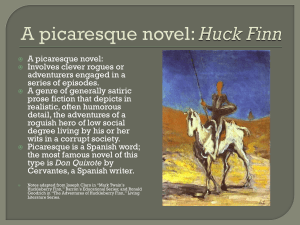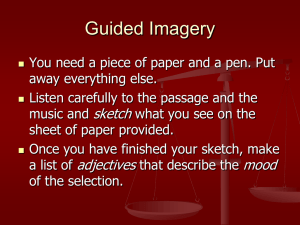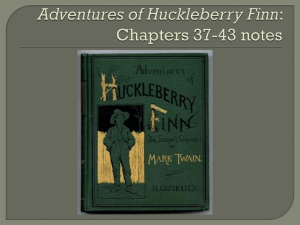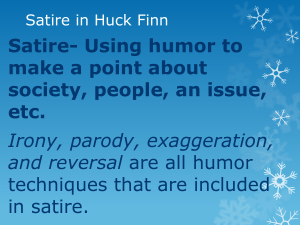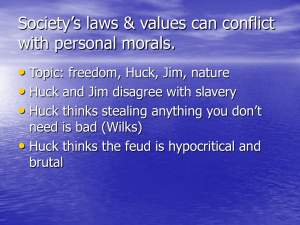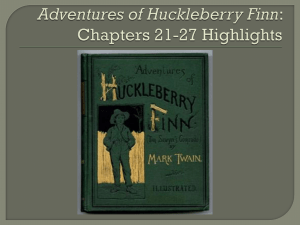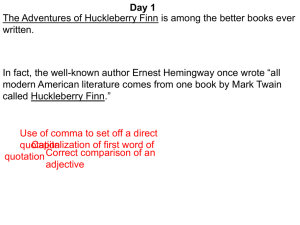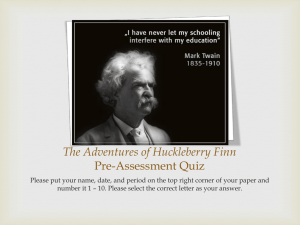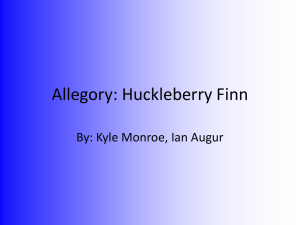The Adventures of Huckleberry Finn
advertisement
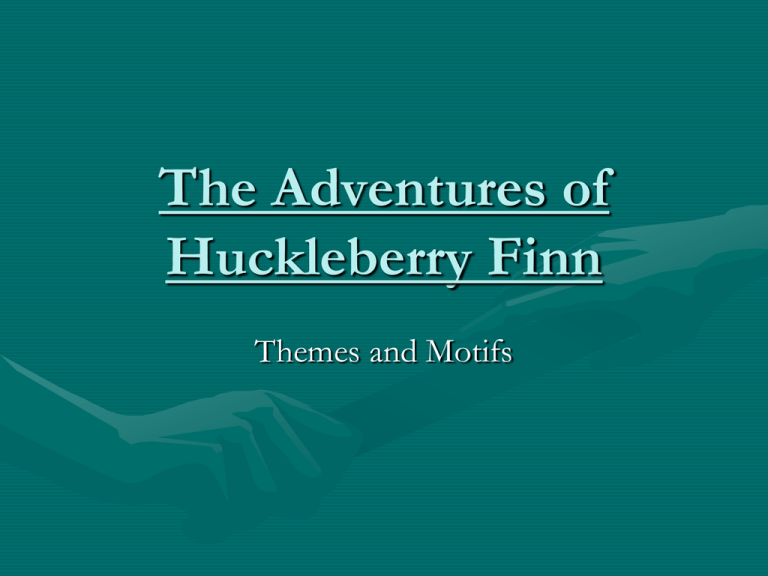
The Adventures of Huckleberry Finn Themes and Motifs Themes • Racism and Slavery – By the early 1880’s Reconstruction, the plan to put the United States back together after the Civil War and integrate slaves into freed society, had hit rock bottom. – Twain made a powerful decision to describe a system that no longer existed, when doing so could lead the unsympathetic reader to claim that “things” had become much better for blacks. – Slavery was a tough practice to justify; so when white Southerners enacted racist laws or policies under a professed motive of self defense against newly freed blacks, far fewer people, whether Northern or Southern, saw the act as immoral. – In exposing the hypocrisy of slavery, Twain shows how racism distorts the oppressors as much as it does the oppressed. • Education – both intellectual and moral – An outcast, Huck distrusts the morals and precepts of the society that labels him a pariah and fails to protect him from abuse. • Pariah - somebody who is despised and avoided by other people. – This apprehension about society and his growing relationship with Jim lead Huck to question many of the teachings he has received on race. – Time and again the reader will see Huck choosing to “go to hell” rather than go along with what he has been taught. – Huck bases these decisions on his experiences, his own sense of logic, and what his developing conscience tells him. – Through deep introspection he comes to his own conclusions, unaffected by the accepted, and often hypocritical, precepts of Southern culture. – Early in the novel Huck learns to read books, a skill that helps him to later in the novel “read” the world around him, distinguish good from bad, right from wrong, and so on. • Civilized Society – Throughout the novel, Twain depicts society as a structure that has become little more than a collection of degraded rules and precepts that defy logic. • This is evidenced early when the new judge in town allows Pap to keep custody of Huck. • Clearly this decision comments on a system that puts a white man’s rights to his “property” – his slaves – over the welfare and freedom of a black man. – By comparing the plight of slaves to the plight of Huck at the hands of Pap, Twain demonstrates how impossible it is for a society that owns slaves to be just, no matter how “civilized” the society proclaims itself to be. – The shakiness of the justice system that Huck encounters lies at the heart of society’s problems: terrible acts go unpunished, yet frivolous crimes, such as shouting drunken insults, lead to executions. – Rather than maintaining collective welfare, society is marked by cowardice, a lack of logic, and profound selfishness. Motifs • Childhood – Childhood is an important factor in the theme of moral education: only a child is open-minded enough to undergo the development that Huck does. – Huck’s age excuses him in certain situations as Huck knows better than the adults around him, but lacks the guidance that a proper family community should offer him. – Huck as a child is contrasted to Jim as a black man: both are vulnerable, yet Huck, because he is white, has power over Jim. • Lies and Cons – This theme is also linked to the theme of moral development. – As Huck realizes it, telling a lie can actually be a good thing, depending on the circumstance and purpose. – This is part of Huck’s learning process, as he finds that some of the things that he has been taught contradict with what seems to be “right.” • Superstition – Jim’s superstitious beliefs have some basis in reality, or foreshadow events to come. – While Huck dismisses most of Jim’s superstitions as silly, he does come to appreciate Jim’s deep knowledge of the world. – Superstition thus serves as an alternative to accepted social mores, and is a reminder that mainstream conventions are not always right. • Symbols – The Mississippi River – For Huck and Jim, the Mississippi is the purest source of freedom. Alone on their raft, they do not have to answer to anyone and the river carries toward freedom. – For Jim the river carries him toward the free states and for Huck, it carries him away from his abusive father and the restrictive “sivilizing” of St. Petersburg. – The fast moving, fluid river reflects the two characters that are free from society. As well, it reflects the rapid change in their attitudes towards one another. – However, the river also lies between two banks, on which lie towns that Huck and Jim are trying to escape. – As their journey continues, the river becomes merely a means of short-term escape that pushes Huck and Jim even further toward danger and destruction.
